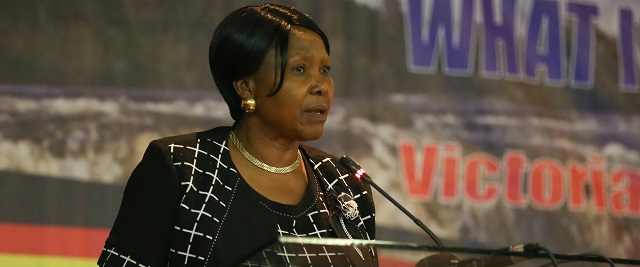Towards a more active participation of Africa in COP 21

Victoria Falls, Zimbabwe, 30 October 2015 (ClimDev-Africa) – The 5th Annual Conference on Climate Change and Development in Africa (CCDA-V) which ended in Victoria Falls, Zimbabwe at the weekend has emboldened Africa for a more positive participation at the forthcoming climate talks in Paris, according to Dr. Fatima Denton, Coordinator of the African Climate Policy Centre (ACPC), and Director of the Special Initiatives Division at the UN Economic Commission for Africa.
Flanked by representatives of the Africa Development Bank, the African Union Commission and the Government of Zimbabwe, Dr. Denton sounded a high note of optimism at the closing session of the conference, saying that she had come away from the 3-day meeting, convinced that Africa has solutions for climate change challenges that it can share with the rest of the world.
“We cannot afford to go to Paris as passive observers in the negotiations. And if anything has become very clear to me from this meeting, it is that we should do everything to keep development at the core of whatever we do by way of planning for climate change”, she said, citing the case of Intended Nationally Determined Contributions (INDCs) as an example of several processes that “will not work for Africa if it is not anchored on Africa’s development priorities”, she explained.
She said that many voices had been heard from the conference raising concerns that Paris was going to be little more than another talk shop but reassured failure in Paris cannot, and should not be an option for Africa because climate change is the single most formidable challenge that Africa faces, sitting as it does at the confluence of every aspect of Africa’s development.
“That is why we still have to put forward our full ambition for a positive outcome by consolidating on our resolve to push our agenda, especially at this time when there is growing confidence in what out continent can achieve”, she added.
The representative of the African Union Commission, Mr. Almami was equally upbeat about how CCDA-V outcomes would strengthen Africa’s negotiating positions in Paris and thanked development partners, without whose sustained assistance ClimDev-Africa initiative would never had come close to organizing a conference such as CCDA-V.
He said that the high caliber of presentations and depth of discussions had not only helped to sharpen Africa’s position on each negotiation stream but had contributed towards a clearer understanding of the difference between what is desirable and what is achievable from the climate talks.
Mr. Justus Kabyemera, Coordinator of the ClimDev-Africa Special Fund, at the African Development Bank He called for a closer look at the pool of Africa’s financial, capital and human resources and to invest in innovative approaches to tap into this pool.
“As we crystalize and firm-up these recommendations, I would like to focus on two opportunities: The four major capital pools for Africa (FX Reserves, Pension Funds, Sovereign Wealth Funds and Diaspora remittances) collectively boast a total of approximately US$ 939 billion using conservative estimates. This is just shy of US$1 trillion. How do we structure investments to attract these moneys into climate finance, he questioned.
He reminded the audience that Africa is also a continent endowed with natural resources. There is a strong need to tap into this critical wealth while also balancing its use for future generations. Africa’s natural resources monetized can yield an estimate of USD 13 to 14.5 trillion”, he explained.
He predicted that “once the continent has demonstrated and inspired confidence other global financial sources can be ‘crowded in’, “a solid position for Africa will be the one that is in tandem with Africa’s industrialization strategy.
In a prepared address by one of her representatives, the Zimbabwe Minister of Environment, Water and Climate, Mrs Oppah Muchinguri reassured participants of her country’s commitment to “contribute effortlessly to the outcome of the Paris agreement and the sustainable development of Africa.”
She recalled the Vice President’s call for the promotion of low carbon development technologies and the provision of finance for technologies development and transfer; the provision of equitable space for development and the need to allow developing countries to first develop before embracing the greening of the economy.
He called on African negotiators to ensure that the 2015 climate agreement provides a clear framework for means of implementation that are measurable, reportable and verifiable before recalling the sacrosanct principle of common but differentiated responsibilities and respective capabilities in the new agreement.
The 5th Annual Conference on Climate Change and Development in Africa (CCDA-V) brought together over 400 scientists, policy makers and representatives of civil society groups who discussed a selection of about 60 scientific contributions from the 800 that the conference secretariat had received.
Bearing this in mind, it is fair to say that although many still decry the paucity of research contribution by African scientists to the global climate discourse, the ClimDev-Africa initiative has, in five years, constituted an impressive reservoir of scientific papers on climate change.
The theme of CCDA-V: “Africa, Climate Change and Sustainable development: What is at stake at Paris and beyond?” The theme had been so chosen to frame presentations and discussions in ways that concrete proposals could be elicited to strengthen Africa’s contributions at COP 21 which opens in Paris, France at the end of this month. The Victoria Falls Conference came during a watershed year in global climate negotiations and its content and outcomes will impact Africa’s position on climate change for the next several years.
Issued by ClimDev-Africa News Service
- Log in to post comments


